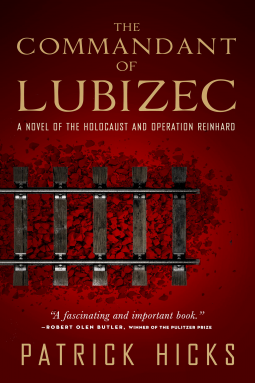
The Commandant of Lubizec
A Novel of The Holocaust and Operation Reinhard
by Patrick Hicks
This title was previously available on NetGalley and is now archived.
Send NetGalley books directly to your Kindle or Kindle app
1
To read on a Kindle or Kindle app, please add kindle@netgalley.com as an approved email address to receive files in your Amazon account. Click here for step-by-step instructions.
2
Also find your Kindle email address within your Amazon account, and enter it here.
Pub Date Mar 25 2014 | Archive Date Aug 21 2014
Steerforth Press | Steerforth
Description
The Commandant of Lubizec is a harrowing account of a death camp that never actually existed but easily could have in the Nazi state. It is a sensitive, accurate retelling of a place that went about the business of genocide. Told as a historical account in a documentary style, it explores the atmosphere of a death camp. It describes what it was like to watch the trains roll in, and it probes into the mind of its commandant, Hans-Peter Guth. How could he murder thousands of people each day and then go home to laugh with his children? This is not only an unflinching portrayal of the machinery of the gas chambers, it is also the story of how prisoners burned the camp to the ground and fled into the woods. It is a story of rebellion and survival. It is a story of life amid death.
With a strong eye towards the history of the Holocaust, The Commandant of Lubizec compels us to look at these extermination centers anew. It disquiets us with the knowledge that similar events actually took place in camps like Bełzec, Sobibór, and Treblinka. The history of Lubizec, although a work of fiction, is a chillingly blunt distillation of real life events. It asks that we look again at "Operation Reinhard". It brings voice to the silenced. It demands that we bear witness.
Advance Praise
"A heart-rending novel about a Nazi death camp that didn't exist—but could have. Hicks. . . tells the story of the fictional Lubizec as if it were a historical account, complete with footnotes and quotes from future fictional documentaries, to devastating effect. . . . Hicks' prose is clear and unflinching, and while, as a result, there are many difficult-to-read scenes, this is as it should be. . . .Thought-provoking and gut-wrenchingly powerful." -- Kirkus Reviews
"The fictional presentation here measures up to any factual account of the Holocaust this reviewer has ever read. Highly recommended, especially for general readers who wish to know more about this unspeakable chapter of human history. Even specialists will be taken in by its human-interest dimension." -- Library Journal
"This is a vividly detailed, terrifying, convincing, and completely spellbinding story rooted in those murderous events we now call the Holocaust. It is also the story of a loving, good-humored family man who each morning goes off to oversee mass homicide -- a dramatic example of what Hannah Arendt once referred to as 'the banality of evil.' Patrick Hicks has accomplished a very difficult literary task. He has a given a believable and fresh and original face to barbarism. What a fine book this is." -- Tim O'Brien, author of The Things They Carried
"Out of the cooling ashes of Holocaust history, Patrick Hicks manages to break our hearts with a story we thought we already knew. The Commandant of Lubizec is profound, provocative, and profane in all the best ways. While reading The Commandant of Lubizec, one question kept running through my mind: 'Was it really this bad?' Through his all-too-real fiction, Patrick Hicks convinces me that, sadly, the answer is 'Yes.' The Commandant of Lubizec is important and unforgettable."-- David Abrams, author of Fobbit, a novel about the Iraq War
"In a powerful blend of research and imagination, Patrick Hicks ushers us through the history of a prototypical death camp during the Holocaust. This novel mourns the millions who were silenced, while reminding us how ordinary and matter-of-fact the face of evil can be. The Commandant of Lubizec is a painfully necessary book." -- Clint McCown, author of War Memorials and Haints; winner of the American Fiction Prize
"In The Commandant of Lubizec, Patrick Hicks imagines the unimaginable and thus gives us a glimpse into the terrible complexity of the human heart. This is a fascinating and important book." -- Robert Olen Butler, Pulitzer Prize winner, author of Good Scent from a Strange Mountain, They Whisper, and A Small Hotel
"The Commandant of Lubizec melds the historian’s factual precision with a storyteller’s compassion and love for humanity. This is fiction at its highest register -- creating inroads into the past so that we might hear those murdered in the extermination camps of the Holocaust, so that we might better recognize the world we have inherited. Profound and trenchant, The Commandant of Lubizec is a brave and unflinching book. It is a stunning literary debut. I urge you to read it before it’s made into a film." -- Brian Turner, author of Here, Bullet and Phantom Noise
"In The Commandant of Lubizec, Patrick Hicks may have invented a brand new genre, the fictional documentary. This novel seems so convincingly based in evidence that any reader unsure of the names of the Nazi death camps is likely to read it as non-fiction—which is part of Hicks’ deep intent. He reveals to us how quickly we lose track of history and how troubling that loss is. In writing a novel about those who survived a fictional death camp, he mysteriously makes us feel and understand the millions of deaths in the real ones. Through his playful art, he makes us feel and understand the horror of the Holocaust in ways most non-fiction simply cannot. It’s a remarkable and elegant artistic achievement. This is a novel I deeply admire." -- Kent Meyers, author of The Work of Wolves and Twisted Tree
Marketing Plan
The author is well connected in academia and the media, as well as to literary festivals and the indie bookstore community.
There will be an ambitious author tour for bookstore, college campus and book festival readings and for media interviews in numerous locations in all of the following states: SD, ND, NE, IL, IA, MO, MN, NV, OR, CA, NJ, RI, MD, CT.
Author tours and events in the UK and Ireland. The author's wife is English and the author has dual US/Irish citizenship. He is well connected with schools, stores and media in both countries.
Major ARC printing and distribution.
Widespread reviews.
Indie Next - September White Box Mailing.
ARCs at Heartland, NEIBA and NCIBA Shows
B&N Discover Submission
Featured title and author appearance at the ABA's Winter Institute 2014.
Available Editions
| EDITION | Other Format |
| ISBN | 9781586422202 |
| PRICE | $16.00 (USD) |
Links
Average rating from 12 members
Featured Reviews
 Susan R, Reviewer
Susan R, Reviewer
This novel was inspired by Operation Reinhardt, the code name given for the Nazi plan to murder Polish Jews and which led to two million people being sent to the death camps of Belzec, Sobibor and Treblinka. The author has used a fictional camp, Lubizec, which is representative of the three death camps and has invented a whole history for this camp – including the Commandant Hans-Peter Guth – of the title. The book is written in a documentary style, in which the author takes us through the history of the camp; Guth being appointed, his wife and children, other members of the SS who were guards, the prisoners, the methods of killing prisoners and he even creates fictional memoirs, such as that written by the daughter of the Commandant.
Guth is a strange mixture of murderer and family man and the author explores those kind of issues by asking difficult questions. How does a man wipe out other men’s families and then go home to his own? How does he stand by and watch a group of orphan children be gassed and yet be a good father? There are many difficult questions in this riveting read. Did people in the local village understand what was going on at the camp and why did everybody stand by and allow it to happen? Yet, the author is, while never totally detached, more interested in presenting the facts and gently allowing readers to draw their own conclusions about the horrific statistics. The huge mounds of goods – spectacles, hair, teeth – stolen from prisoners. The personal cost; the lives lost, the callous indifference and the sheer insanity, and brutality, are hard to take in.
Of the 710,000 people who entered the gates of the fictional camp of Lubizec, only 43 survived. If those statistics are representative of other camps in Operation Reinhardt, it shows why they are less represented in holocaust literature. These were death camps, not work camps, and people went there for one reason and that was to be killed. I found the most chilling part of the book to be where Guth cuts down panic by creating the station that people expected to see when exiting the train, complete with pots of flowers and travel posters... This is an interesting, thought provoking and important read. The novel takes us through the history of the camp, from conception to interviews long after the war. I guarantee it will be a book which will stay with you and, although you may find it upsetting at times, you will be glad that you have read it. Lastly, as someone who helps run a reading group myself, I was pleased to see a Reading Group Guide at the back of the book, as well as an insightful conversation with the author about writing the book and the research he undertook.
Lastly, I received a copy of the novel, from the publisher, for review.
Holy moly what a book. I have read many books about the Holocaust but I think this is the first time I realized a difference between a death camp and a concentration camp.
The camp written about in the book, Lubizec, is a fictional death camp. As I started reading, I thought the book was non-fiction even though I hadn't heard of Lubiczek before. However, it's a work of fiction based up on the camps Belzec, Sobibor and Treblinka.
Written in a documentary style, the story is told from the viewpoint of one of only seven men to survive mass murders over over 700,000 people, Chaim Zischer.
This detailed, fictional account of a Nazi death camp is one that should be read. I worry that people will forget the atrocities that happened in these camps as the population grows older and the survivors finally pass away.
I would highly recommend this book. I couldn't put it down.





